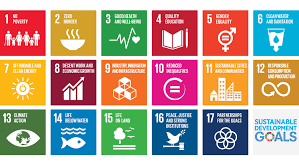The Meaning of SDG
The term “SDG” stands for Sustainable Development Goals. These are a set of 17 global goals established by the United Nations in 2015 as part of the 2030 Agenda for Sustainable Development. The SDGs are a universal call to action to end poverty, protect the planet, and ensure that all people enjoy peace and prosperity.
Each of the 17 Sustainable Development Goals addresses different aspects of sustainable development, including social, economic, and environmental dimensions. The goals range from eradicating poverty and hunger to promoting gender equality, ensuring access to clean water and sanitation, and combating climate change.
The SDGs are interconnected and aim to achieve a balance between economic growth, social inclusion, and environmental protection. They provide a roadmap for countries, organisations, and individuals to work together towards a more sustainable future for all.
By focusing on areas such as education, health, infrastructure, innovation, and partnerships, the SDGs seek to create a world where no one is left behind. Achieving these goals requires collaboration at local, national, and global levels to address complex challenges that affect us all.
Understanding the Sustainable Development Goals: A Guide to Their Meaning, Purpose, and Impact
- What does SDG stand for?
- How many Sustainable Development Goals are there?
- When were the SDGs established?
- What is the purpose of the SDGs?
- How do the SDGs address sustainable development?
- Why are the SDGs important?
- What can individuals do to contribute to achieving the SDGs?
What does SDG stand for?
SDG stands for Sustainable Development Goals. Introduced by the United Nations in 2015 as part of the 2030 Agenda for Sustainable Development, the SDGs are a set of 17 global goals aimed at addressing various social, economic, and environmental challenges to create a more sustainable future for all. These goals encompass a wide range of issues, including poverty eradication, gender equality, clean energy access, climate action, and more. The SDGs serve as a universal call to action for individuals, organisations, and governments worldwide to work collaboratively towards achieving a better and more equitable world by the year 2030.
How many Sustainable Development Goals are there?
There are a total of 17 Sustainable Development Goals (SDGs) established by the United Nations as part of the 2030 Agenda for Sustainable Development. These goals cover a wide range of areas, including poverty eradication, quality education, gender equality, clean water and sanitation, affordable and clean energy, sustainable cities and communities, climate action, and more. Each goal plays a crucial role in promoting sustainable development worldwide and addressing pressing global challenges to create a better future for all.
When were the SDGs established?
The Sustainable Development Goals (SDGs) were established in 2015 as part of the 2030 Agenda for Sustainable Development by the United Nations. These 17 global goals were created to address a wide range of social, economic, and environmental challenges with the aim of achieving a more sustainable and prosperous future for all.
What is the purpose of the SDGs?
The purpose of the Sustainable Development Goals (SDGs) is to provide a comprehensive framework for addressing global challenges and promoting sustainable development worldwide. These 17 goals serve as a roadmap towards a more equitable, inclusive, and environmentally sustainable future for all. By setting specific targets and indicators, the SDGs aim to mobilise action at all levels – from governments and businesses to civil society and individuals – to eradicate poverty, protect the planet, and ensure prosperity for present and future generations. The overarching goal of the SDGs is to create a world where economic progress is balanced with social equity and environmental stewardship, ultimately striving for a more just and sustainable world for everyone.
How do the SDGs address sustainable development?
The Sustainable Development Goals (SDGs) address sustainable development by providing a comprehensive framework that encompasses social, economic, and environmental aspects of sustainability. Through the 17 interconnected goals, the SDGs aim to tackle a wide range of challenges facing our world today, such as poverty, inequality, climate change, and environmental degradation. By promoting actions that balance economic growth with social inclusion and environmental protection, the SDGs offer a roadmap for countries and stakeholders to work together towards a more sustainable future. This holistic approach ensures that sustainable development is achieved through targeted efforts in areas such as education, healthcare, clean energy, and responsible consumption and production.
Why are the SDGs important?
The Sustainable Development Goals (SDGs) are crucial because they provide a comprehensive framework for addressing the most pressing global challenges we face today. By setting clear targets and indicators across a range of critical areas such as poverty, health, education, climate change, and inequality, the SDGs guide efforts towards a more sustainable and equitable world. They promote collaboration between governments, organisations, and individuals to work collectively towards achieving these goals by 2030. The SDGs are important as they represent a shared commitment to building a better future for all people and the planet, ensuring that no one is left behind in the pursuit of a more prosperous and harmonious world.
What can individuals do to contribute to achieving the SDGs?
Individuals play a crucial role in contributing to the achievement of the Sustainable Development Goals (SDGs). There are several ways in which individuals can make a positive impact, such as adopting sustainable lifestyle choices, raising awareness about the SDGs within their communities, supporting local initiatives that align with the goals, and advocating for policy changes that promote sustainability. By making conscious decisions in areas such as consumption, waste reduction, and community engagement, individuals can collectively help drive progress towards a more sustainable and equitable future for all.
